Results 1,291 to 1,320 of 1485
-
2018-01-05, 03:55 PM (ISO 8601)Ogre in the Playground

- Join Date
- Oct 2009
- Gender

 Re: Got a Real-World Weapon, Armor or Tactics Question? Mk. XXIV
Re: Got a Real-World Weapon, Armor or Tactics Question? Mk. XXIV
Yes absolutely, I think it's fascinating.
This is why successful fantasy writers like George RR Martin borrow so heavily from historical perspective, he's basically taking something like the English or French perspective on Late medieval Europe, albiet in simplified form.
If you want to make it really trippy then make the world what they thought it was including all of their susperstitions and strange beliefs, which are a lot wilder than most people know. Even the Christian stuff like the cults of the various saints and all their magic powers, but there was also tons of thinly veiled pagan stuff. Miners in Silesia and the Carpathians were afraid of Kobolds and Mountain trolls, and tried to appease them. The Baltic was haunted by Werewolves. And the Alps were just nuts.
This being the eve of 12th night and the dawn of the years Carnival traditions, here are a few videos to watch to get a sense of just how weird (and persistent) medieval culture really was
https://youtu.be/EZcnVOXW8qA
https://youtu.be/y76yAm5bwB4
https://youtu.be/RVMScMOGnUE
G
-
2018-01-05, 04:00 PM (ISO 8601)Ogre in the Playground

- Join Date
- Oct 2009
- Gender

 Re: Got a Real-World Weapon, Armor or Tactics Question? Mk. XXIV
Re: Got a Real-World Weapon, Armor or Tactics Question? Mk. XXIV
Oh trust me, that is still a thing in the modern HEMA revival. People think they have learned 'enough of the basics' and are ready to just do fitness training and spar- they don't want to spend the hours figuring out complicated technical fencing systems let alone train in them enough hours to really learn them ... until somebody kicks their ass in a tournament using those same 'geek' techniques, which has happened many times now. Then everyone scrambles to catch up.
It's an amusing and by now, somewhat predictable cycle.
The other side of it is when the guy who was beating people in his 20's mainly on being some kind of phenomenal athletic specimen, hits 35 and realizes he's starting to slow down, but still wants to win. That's when the 'geometry' gets a second look...
G
-
2018-01-05, 04:08 PM (ISO 8601)Ogre in the Playground

- Join Date
- Oct 2009
- Gender

 Re: Got a Real-World Weapon, Armor or Tactics Question? Mk. XXIV
Re: Got a Real-World Weapon, Armor or Tactics Question? Mk. XXIV
I think we would have had some kind of explosive pyrotechnic weapons. The real 'magic' about gunpowder was and is really the potassium nitrate, and they were starting to figure that out going pretty far back, using it as an ingredient, albiet a rare one, in Latin, Greek, Arabic, and South - Asian / Hindu alchemy back to around the time the Chinese figured out early gunpowder, circa ~ 9th century.
Prior to that, flame weapons like Greek Fire projectors, naptha grenades and other nasty flaming weapons used by the Romans especially in sieges had already made a name for themselves. Given the intense level of activity in alchemical experimentation and all the other stuff they had discovered by say, the 13th Century I do think it was inevitable.
It did remain kind of a niche thing for a long time tough, firearms and gunpowder grenades were kind of specialist siege weapons in China for three centuries when they arrived in Europe in the 13th Century and weren't necessarily all that much better than naptha bombs or crossbows, it was the innovations in Europe, I think (I'm not that well versed on what happened in China) with both firearms and cannon, that suddenly made gunpowder more interesting and therefore triggered this whole industry of trading, refining and then eventually manufacturing potassium nitrate (which at one point was being imported all the way from Iceland of all places, thanks to their numerous volcanoes I think... or maybe it's birds I don't know) which is what ultimately, in conjunction with rapidly improving metalurgy and iron industry, that made the firearms / cannon revolution possible in the 14th Century.
G
-
2018-01-05, 04:08 PM (ISO 8601)Ogre in the Playground


- Join Date
- Nov 2010
- Location
- Beyond the Ninth Wave
- Gender

 Re: Got a Real-World Weapon, Armor or Tactics Question? Mk. XXIV
Re: Got a Real-World Weapon, Armor or Tactics Question? Mk. XXIV
I think that's not really possible to estimate - there's not necessarily a reason to discover gunpowder aside from stumbling onto it. And of course a lot of our early knowledge of chemistry comes from alchemy, which was being done all over Eurasia. We don't really have any way to approach the question of how else we would have acquired that knowledge, because that's pretty much the entire way that it happened. Of course that's also the flipside: there's the argument to be made that alchemists searching for immortality is itself inevitable.
 Originally Posted by KKL
Originally Posted by KKL
-
2018-01-05, 04:19 PM (ISO 8601)Ogre in the Playground

- Join Date
- Oct 2009
- Gender

 Re: Got a Real-World Weapon, Armor or Tactics Question? Mk. XXIV
Re: Got a Real-World Weapon, Armor or Tactics Question? Mk. XXIV
One thing worth noting
Chinese alchemy was focused on immortality, famously leading to gunpowder but also traditional Chinese medicine and I believe they are also the longest lived people.
Hindu alchemy was focused on iron, the 'riddle of steel' you might say. And they invened Wootz steel swords and stuff like this iron pillar which has sat in a Tropical climate for 17 centuries without a spot of rust on it
https://en.wikipedia.org/wiki/Iron_pillar_of_Delhi
Arab alchemy was mainly focused on Takwin, the creation of artificial life. And while they didn't figure out genetic engineering as far as I know (though there are some wonderful legends of golems and lab grown homonculus), they did figure out how to make automata, or clockwork robots, based on mechanical engineering they hacked from Greek sources. This in turn was later hacked by the Latin Europeans to become the basis of a lot of the mechanical water wheel and windmill powered industry they created in the 12th-13th Centuries.
https://en.wikipedia.org/wiki/Takwin
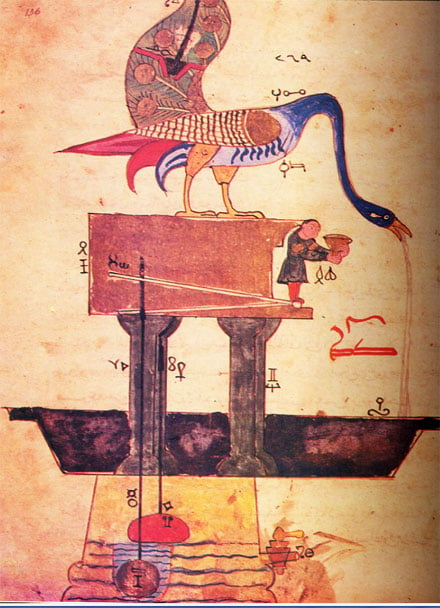
Spoiler: Muslim Automata
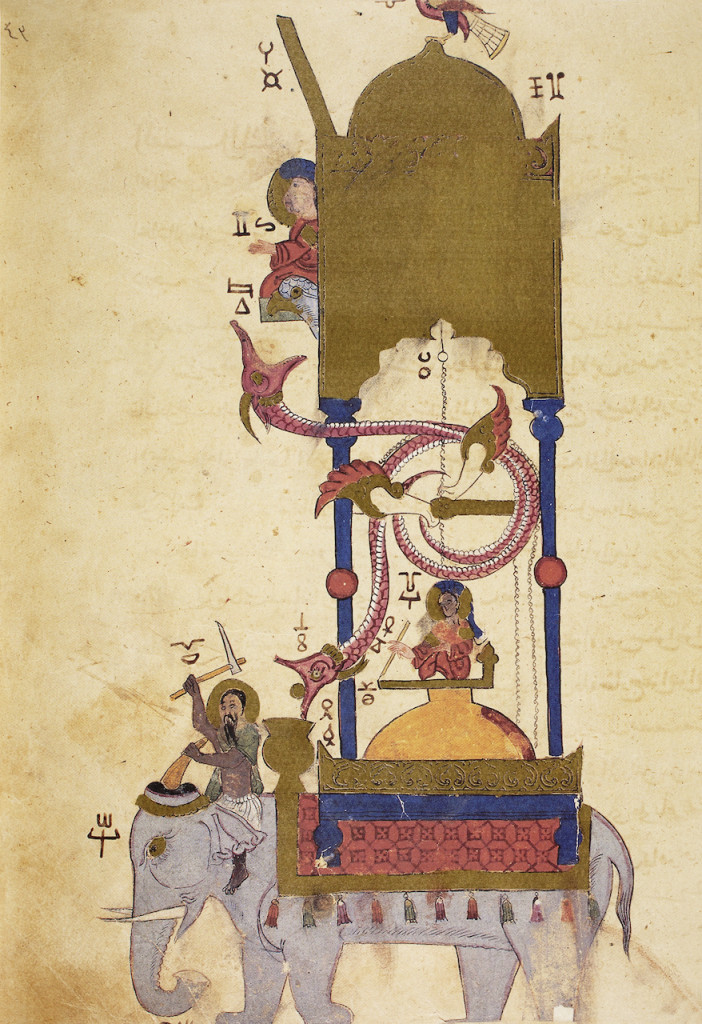
Latin European alchemy was mainly focused on Gold, famously - not in the cliche sense of the 'Philosophers Stone' but much more on practical matters like distilling very strong acids to process gold ore and separate lead from silver and so on, and to operate powerful machines that could drain flooded mines and smash rock.
But they all read from each other and they all shared math and mnemonic systems and chemistry. Another example of multiple perspective which did live in the same world.
India adopted Arab / Latin / Greek Aristotelean medicine and still teaches it in Universities there. Arabs and Latin Europeans adopted Hindu numerals. Everyone adapted Chinese gunpowder, and learned from each others math, astronomy, optics, geared clockwork systems and so on.
G
-
2018-01-05, 04:27 PM (ISO 8601)Bugbear in the Playground


- Join Date
- Apr 2007
- Location
- kendal, england
- Gender

 Re: Got a Real-World Weapon, Armor or Tactics Question? Mk. XXIV
Re: Got a Real-World Weapon, Armor or Tactics Question? Mk. XXIV
i had a similar thought over the Christmas period, watching the Annie Lennox cover of "God Rest Ye Merry Gentlemen" (a traditional carol dating back to at least 1830), and the comments are full of people talking about all the "pagan" imagery in the video, and how far she was taking form traditional Christmas vibes.
Thing is, i'm sat their thinking "that's not pagan, that just folk stylings. I've seen much of the same watching morris dancers". it sounded like the sort of thing at the Cayleigh (folk dances) i used to go to with my parents. Clearly, my understanding of "traditional" Christmas is very different, with a greater emphasis on the "rebirth" element and return of green and pleasant times.
but then again, I'm English, and my pre army hometown, Kendal, has a school older than the Jamestown colony, and the "new" castle (built in the 12th century), as well as a Motte that once was the site of the "old" castle. so maybe my sense of "normal" is a bit different.
 Then it's Tommy this, an' Tommy that, an` Tommy, 'ow's yer soul? "
Then it's Tommy this, an' Tommy that, an` Tommy, 'ow's yer soul? "
But it's " Thin red line of 'eroes " when the drums begin to roll
The drums begin to roll, my boys, the drums begin to roll,
O it's " Thin red line of 'eroes, " when the drums begin to roll.
"Tommy", Rudyard Kipling
-
2018-01-05, 04:41 PM (ISO 8601)Ettin in the Playground

- Join Date
- Nov 2010
- Location
- Toledo, Ohio
- Gender

 Re: Got a Real-World Weapon, Armor or Tactics Question? Mk. XXIV
Re: Got a Real-World Weapon, Armor or Tactics Question? Mk. XXIV
One thing that needs to be kept in mind is that the Chinese weren't the only ones who had the opportunity to figure it out. There were enough people toying with the right chemicals that the chance of figuring out gunpowder was pretty high.
The other important thing to keep in mind is that pretty much all pre-percussion firearm concepts were tried within a century or so of discovering the first black powder, and failed mostly because other forms of industry and science weren't there to make them practical. For this reason, even a fairly late introduction of gunpowder would have a very real chance of "catching up" to history pretty quickly.
-
2018-01-05, 04:43 PM (ISO 8601)Ogre in the Playground


- Join Date
- Nov 2012
- Gender

 Re: Got a Real-World Weapon, Armor or Tactics Question? Mk. XXIV
Re: Got a Real-World Weapon, Armor or Tactics Question? Mk. XXIV
You should google about mythology and folklore in Spain. Lots of pockets of barely concealed pagan renmants surviving through all the Middle Ages well into the Modern Age or even later: Worship of Goddess Diana, Anbotoko Mari and Akerbeltz, belief in reincarnation, shaman-like folk healers living in caves, real people trying to learn wizardry, tales about merfolk, women kidnapped by fairies, ghost processions, ...etc.
A fun bit: Apostle Saint James was supposed to have made a miracle to protect pilgrims... so in the north of Spain, wolves were supposed to eat only bandits and thieves, not honest travellers. Medieval saints didn't joke around...
-
2018-01-05, 04:47 PM (ISO 8601)Ogre in the Playground

- Join Date
- Oct 2009
- Gender

-
2018-01-05, 04:50 PM (ISO 8601)Titan in the Playground


- Join Date
- May 2016
- Location
- The Lakes
 Re: Got a Real-World Weapon, Armor or Tactics Question? Mk. XXIV
Re: Got a Real-World Weapon, Armor or Tactics Question? Mk. XXIV
Thank you.
I do agree that it was "when?" and not "if?", and that we'd have had firearms eventually.
If I might rephrase slightly, then, when is the latest it would be "reasonable" to put off the discovery and development of gunpowder to?It is one thing to suspend your disbelief. It is another thing entirely to hang it by the neck until dead.
Verisimilitude -- n, the appearance or semblance of truth, likelihood, or probability.
The concern is not realism in speculative fiction, but rather the sense that a setting or story could be real, fostered by internal consistency and coherence.
The Worldbuilding Forum -- where realities are born.
-
2018-01-05, 04:53 PM (ISO 8601)Titan in the Playground


- Join Date
- May 2016
- Location
- The Lakes
 Re: Got a Real-World Weapon, Armor or Tactics Question? Mk. XXIV
It is one thing to suspend your disbelief. It is another thing entirely to hang it by the neck until dead.
Re: Got a Real-World Weapon, Armor or Tactics Question? Mk. XXIV
It is one thing to suspend your disbelief. It is another thing entirely to hang it by the neck until dead.
Verisimilitude -- n, the appearance or semblance of truth, likelihood, or probability.
The concern is not realism in speculative fiction, but rather the sense that a setting or story could be real, fostered by internal consistency and coherence.
The Worldbuilding Forum -- where realities are born.
-
2018-01-05, 05:05 PM (ISO 8601)Titan in the Playground


- Join Date
- May 2016
- Location
- Corvallis, OR
- Gender

 Re: Got a Real-World Weapon, Armor or Tactics Question? Mk. XXIV
Re: Got a Real-World Weapon, Armor or Tactics Question? Mk. XXIV
In my experience, there are still large pockets of mystical thinking/“pagan” (a bad term, but whatever) traditions in lots of places. I remember running into lots of technically Christian but practically pagan (believing and propitiating witches, pagan deities, monsters, etc) people in the Baltics in 2001.
Dawn of Hope: a 5e setting. http://wiki.admiralbenbo.org
Rogue Equivalent Damage calculator, now prettier and more configurable!
5e Monster Data Sheet--vital statistics for all 693 MM, Volo's, and now MToF monsters: Updated!
NIH system 5e fork, very much WIP. Base github repo.
NIH System PDF Up to date main-branch build version.
-
2018-01-05, 05:15 PM (ISO 8601)Ogre in the Playground

- Join Date
- Feb 2007
- Location
- Bristol, UK
- Gender

 Re: Got a Real-World Weapon, Armor or Tactics Question? Mk. XXIV
Re: Got a Real-World Weapon, Armor or Tactics Question? Mk. XXIV
You've just explained why I find most fantasy a pale, uninteresting shadow compared to history. Researching historical settings is full of rich, interesting details that made-up settings can't match. Plus you're learning real things, not filling your head with fiction.
Wushu Open Reloaded
Actual Play: The Shadow of the Sun (Acrozatarim's WFRP campaign) as Pawel Hals and Mass: the Effecting - Transcendence as Russell Ortiz.
Now running: Tyche's Favourites, a historical ACKS campaign set around Massalia 300BC.
In Sanity We Trust Productions - our podcasting site where you can hear our dulcet tones, updated almost every week.
-
2018-01-05, 05:26 PM (ISO 8601)Titan in the Playground


- Join Date
- May 2016
- Location
- The Lakes
 Re: Got a Real-World Weapon, Armor or Tactics Question? Mk. XXIV
It is one thing to suspend your disbelief. It is another thing entirely to hang it by the neck until dead.
Re: Got a Real-World Weapon, Armor or Tactics Question? Mk. XXIV
It is one thing to suspend your disbelief. It is another thing entirely to hang it by the neck until dead.
Verisimilitude -- n, the appearance or semblance of truth, likelihood, or probability.
The concern is not realism in speculative fiction, but rather the sense that a setting or story could be real, fostered by internal consistency and coherence.
The Worldbuilding Forum -- where realities are born.
-
2018-01-05, 05:31 PM (ISO 8601)Ogre in the Playground

- Join Date
- Oct 2009
- Gender

 Re: Got a Real-World Weapon, Armor or Tactics Question? Mk. XXIV
Re: Got a Real-World Weapon, Armor or Tactics Question? Mk. XXIV
Well said. I have kind of a rule - if the author can make his or her fantasy world better or more interesting than the analogous historical period they are using for Frog DNA, then I'll watch. But it has to be good if I'm going to invest the effort. I really don't want to learn 'Klingon'.
People always come back at you with 'Dude it's a show with dragons / zombies / flying turtles' whatever, but hey, if they were all walking around dressed like this:
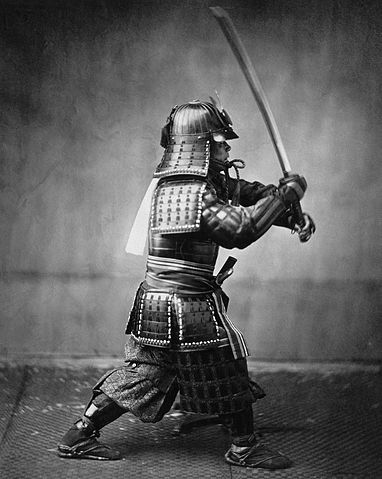
I'd expect the katanas to be sharp and I'll be looking for some Yumi bows.
When I see someone dressed up like a Roman Legionairre i want to see a pilum...
And when I see someone in plate armor on a horse i expect a lance, or I wanna know why.... and I don't want to see people cutting through his armor like it's cardboard. Because then it starts to seem like it IS cardboard spraypainted silver (which it probably is...)
G
-
2018-01-05, 05:52 PM (ISO 8601)Barbarian in the Playground

- Join Date
- Feb 2012
 Re: Got a Real-World Weapon, Armor or Tactics Question? Mk. XXIV
Re: Got a Real-World Weapon, Armor or Tactics Question? Mk. XXIV
There does seem to be some of that, but French were experimenting with combined arms during the HYW. The Problem was that even with combined arms winning a massed battle on the offensive tended to be very tricky. At Crecy the French had many infantry and famously the Genoese crossbowmen. At Portiers the majority of the French forces attacked on foot with some cavalry support, but that similarly ended in failure. At Agincourt the French plan was to play it cautiously and surround the English to attack from the flank and rear, but when the french stopped for they day and dismounted to eat and rest up before attacking, Henry V caught them off guard by suddenly performing a rapid advance and replanting his archers' stakes within bow range. The French archers were not in a position to respond at the time so the French vanguard decided to charge ahead without them and the rest of the army followed.
The other thing to keep in mind is that much of the fighting during the HYW still took the form of skirmishes or "chevauchee" cavalry raids. For both of these the best troops to use were still typically cavalry, either mounted archers or knights armed with somewhat lighter armor and lancegays, to either attack quickly or respond to enemy raids in time.
After the war ended Heavy cavalry returned to being the main focus of French tactics with the creation of the compagnies d'ordonnance.
-
2018-01-05, 06:02 PM (ISO 8601)Titan in the Playground


- Join Date
- May 2016
- Location
- The Lakes
 Re: Got a Real-World Weapon, Armor or Tactics Question? Mk. XXIV
It is one thing to suspend your disbelief. It is another thing entirely to hang it by the neck until dead.
Re: Got a Real-World Weapon, Armor or Tactics Question? Mk. XXIV
It is one thing to suspend your disbelief. It is another thing entirely to hang it by the neck until dead.
Verisimilitude -- n, the appearance or semblance of truth, likelihood, or probability.
The concern is not realism in speculative fiction, but rather the sense that a setting or story could be real, fostered by internal consistency and coherence.
The Worldbuilding Forum -- where realities are born.
-
2018-01-05, 06:12 PM (ISO 8601)Ogre in the Playground


- Join Date
- Nov 2010
- Location
- Beyond the Ninth Wave
- Gender

 Re: Got a Real-World Weapon, Armor or Tactics Question? Mk. XXIV
Re: Got a Real-World Weapon, Armor or Tactics Question? Mk. XXIV
All of which is very tied up in metaphor and the tradition of self-cultivation. Taoist alchemy in particular tended to make little or no functional distinction between work with chemicals (external alchemy) and "internal alchemy" (meditation and exercise, basically). Some alchemists even believed that their training would allow them to develop an organ that would physically secrete the elixir of immortality. A lot of the association between alchemy and gold can be seen very early in these traditions - Taoist folklore ascribes gold the special property of occupying none or all of the five phases, and gold's resistance to corrosion was seen as either a metaphor for agelessness, or in many cases a literal property to be assimilated.
Likewise in the Mideast and Europe, the dual preoccupations with eternal life and glittery glittery gold are largely inextricable. The word elixir comes from the Arabic "al-iksir," a hypothetical powdered substance that would have been created with the Philosopher's Stone and allowed for the transmutation of substances. And as was the case in China, the Philosopher's Stone was described even in antiquity as a perfect balance of the elements. I have less knowledge of Hindu alchemy, but IIRC it was very influential on the Chinese traditions. Certainly immortality is a common refrain in Hindu and Buddhist literature.
My point is that all of these traditions were interrelated, and were generally motivated by the desire for (a) power over life and death, and (b) riches (i.e. power over life and death :P). Somebody almost certainly would have stumbled on gunpowder, because just about everyone was screwing around trying to get the same things. Originally Posted by KKL
Originally Posted by KKL
-
2018-01-05, 06:12 PM (ISO 8601)Firbolg in the Playground


- Join Date
- Nov 2009
- Gender

 Re: Got a Real-World Weapon, Armor or Tactics Question? Mk. XXIV
Re: Got a Real-World Weapon, Armor or Tactics Question? Mk. XXIV
There was an era between Carolingian and the rise of Italy, in which France was a superpower when it came to poetry outside of Latin. So there are the Chanson de Roland (XI cent.), Chrétien de Troyes (XII cent.), Arnaut Daniel, Bertrand de Born, William IX, all of which would have a massive influence on Italian poetry. This had various reasons. Northern Italy was a rich market for French and Provençal performers, both on court and city square levels. The Normans immediately had French-speaking performers come to their court as soon as they conquered Sicily. Frederick II later invited Provençals too, and the birth of Italian literature as it exists was due to the way in which the Sicilians served as an example to Tuscany as they appropriated Provençal matter into their own language.
I believe that Paris had an enormous role in the conservation of Averroes. Much of his work is lost, and only a small part is left in Arabic. Much more is left in Hebraic and Latin, and the Latin versions mostly were translated from Hebraic. I had no idea about the Condemnations, though, and they are especially unexpected to me because of Thomas of Aquin, who discussed these authors, and, while polemizing with Averroes, used Aristotle a lot. Interestingly, some argue that setting Aristotle's physical treatises aside forced Europe to develop a new logic and a new attitude towards empiricism and experimentation.
But there is no doubt that, after Italy got its motor running, France became its disciple, while it previously had been the teacher. This is very evident in the language, with French loans to Italian being extremely abundant in the Middle Ages, but, around the XIV century, suddenly it's French that starts absorbing Italian words (a process that has yet to stop).
I think that one Latin treatise about alchemy that was believed to be a translation of an Arab IX century work was actually written in Otranto in the XIII century by a Franciscan friar, with info about making various acids (Liber de inventione veritatis). Dating is actually really iffy -- so others say XIV-XVI century. But it's a time when reactions are well known, and they probably would have been interested into stuff that goes boom -- it's the first work from Western Europe that describes how to make nitric acid, for example. Add that potassium nitrate was already known because of its use for charcuterie. However, the earliest versions might have used calcium nitrate instead, and I could find no info about its use in the Middle Ages, outside of gunpowder.
Anglican priests in England were until fairly recently forbidden to join the populace in any form of Christmas celebration outside the divine service because of this. It was the only thing that was known to be surely Christian.
Tuscans still call Christmas "Ceppo" (=log/stump), because of a ritual way they have/had of burning a huge log during Christmas time. Originally Posted by J.R.R. Tolkien, 1955
Originally Posted by J.R.R. Tolkien, 1955
-
2018-01-05, 06:12 PM (ISO 8601)Ogre in the Playground


- Join Date
- Jul 2013
- Location
- Dixie
- Gender

 Re: Got a Real-World Weapon, Armor or Tactics Question? Mk. XXIV
Re: Got a Real-World Weapon, Armor or Tactics Question? Mk. XXIV
This comment made me think... are there particular categories of melee weapons that especially either take advantage of a wielder's athletic capabilities, or mitigate a lack thereof? What weapon would a particularly strong person choose to best use their strength? What would a skilled but physically weak person use to best make up for that disadvantage? How much does physical strength matter in a battle between two similarly armed, similarly skilled people?
According to common fantasy tropes, the less skilled but hulking combatant ought to have a large axe, hammer, or the like. How much truth is there in that?I'm playing Ironsworn, an RPG that you can run solo - and I'm putting the campaign up on GitP!
Most recent update: Chapter 6: Devastation
-----
A worldbuilding project, still work in progress: Reign of the Corven
Most recent update: another look at magic traditions!
-
2018-01-05, 06:46 PM (ISO 8601)Ogre in the Playground


- Join Date
- Dec 2005
- Location
- Laughing with the sinners
- Gender

 Re: Got a Real-World Weapon, Armor or Tactics Question? Mk. XXIV
Re: Got a Real-World Weapon, Armor or Tactics Question? Mk. XXIV
There are good choices for body types and abilities. There are also styles that take advantage of strength or reach or speed.
Obviously strong people can use heavier weapons more easily, and taller people have an easier time with longer weapons. I'm short and people like to think I'd want a longer weapon to reduce my reach deficit, but it doesn't work that way at all. Longer weapons are balanced for longer people, so I much prefer a shorter weapon. I'm gonna need to close distance anyway, so I practice that and opt for getting in close and using a quicker weapon.
This is one reason why I subscribe to the "no perfect sword" philosophy. My perfect sword is probably not your perfect sword.
I used to try to teach my fencing students, don't try to fight tall if you're short, or fight fast if you're slow. If you're short, learn to get to your distance and fight there, if you're slower, be precise and use smaller movements to achieve the same effect. If you have tons of reach, don't try infighting because you throw away your advantage and the short guy will gut you up close. Keep distance and counter or stop thrust into his lunge and it will drive him nuts.
So, yes, I would tell the hulking but clumsy Ogre to use a big axe and not try to out finesse the elf with rapiers.
There a reason jockeys are short and basketball payers are tall
-
2018-01-05, 07:49 PM (ISO 8601)Ogre in the Playground


- Join Date
- Aug 2013
 Re: Got a Real-World Weapon, Armor or Tactics Question? Mk. XXIV
Re: Got a Real-World Weapon, Armor or Tactics Question? Mk. XXIV
In their defence, real life has all of real life to draw from. An author cannot comprehensively cover all aspects because no oen today can be a Renessaince Man. Tolkien was a linguist not an author and his fantasy work s show that. If I wrote fantasy or an RPG it probably would feature economies that worked much better than D&D.
In Scandinavia Christmas is called "Yule" or rather our local renditions of what in English is called yule. People going on about traditions are large idiots. Our "sacred" Christmas ttraditions are a weird amalgam or ancient belives and stuff that's so modern they were invented after some of the people whining about them not being the proper old ones were born. Almost all christian traditions are papered over pagan traditions and occur on times when older festivities did.
Like Easter and Christmas. :P
My favourite may be Midsummer, that's real big in Scnadinavia, how the church let this pagan thing go on is beyond me. Though also most of current Midsummer is probably not much older than the 1800s anyway.
Santa Claus, arguably the biggest part of Xmas for the West is largely based on a Cocal Cola advertisement illsutrated by a Swedish expat in the first half of the 1900s. People trying to drag out the "traditional" [whatever} celebrations are almsot 100% off their rocker and totally uninformed.
One interesting example is I recently learne dmore about is "Lucia celbratiosn" common at leas tin Sweden and Swedish speaking Finalnd. Peopel who charitavly could eb called conservative have been up in arms when the role of Lucia has bene opened to other people than young blonde pretty girls. Ruining this lovely ancient and very important national holiday right? ERm no. First Lucia of course is Catholic saint or some vaguely mentioned person, supposedly from Sicily martyred at some point in the late Roman Empire. The Reformation supposedly did away with saints in the 1500s. Of course the traditions is filled with pagan folk festivities and various slices of older traditions from various centuries, some of them rather shall we say not very holy. The kicker of course is that the whole thing in it's current format was resurrected in the 1920s as magazine's beauty contest. Which kept going and morphed in to more of nationally observed celebration claiming to remembering a probably not authentic Catholci saint whose companions are part pagan ritual infleunces and large part Catholic procession all of which is celberated on the 13th of December, which naturally used to be the winter soltice before the Gregrian calnder was accepted in the 1700s. The utter mish-mash of various older and newer stuff going into this renders any claim of runing proper old traditions by having a Lucia that is not a young, blonde girl rather, shall we say, odd. Since as it is, it's less than a century old really.
And that's just one minor thing before Xmas. Real world is complicated, and the way things always was, is mostly never how they were.Last edited by snowblizz; 2018-01-05 at 07:51 PM.
-
2018-01-06, 04:00 AM (ISO 8601)Ogre in the Playground

- Join Date
- Aug 2009
 Re: Got a Real-World Weapon, Armor or Tactics Question? Mk. XXIV
Re: Got a Real-World Weapon, Armor or Tactics Question? Mk. XXIV
Some questions concerning ancient arms:
Peltasts are named after their shield, the pelte, which has a characteristic crescent shape.
What purpose does this shape serve?
Axes. The greeks didn't seem to like them very much, but other people did. There is the characteristic persian "pick-like" axe which seems to be called "Sagaris":

What other types of axes would be typical for the 6th to 3rd century BC in mesopotamia, anatolia, the levante and egypt?
And how would they be called?
Spears. There is the hoplite dory ("long spear") and the phalangnite sarrisa ("pike"). Using the same time frame and area as above, are there other types of spears in common use?
From illustrations it appears to me that the Achaemenids employed shorter spears (shorter then both the sarrisa and the dory). How would the be called?
3rd century BC nubian arms. Is there any information on typical nubian weapons, shields and armor in 3rd century BC egypt? Or would they just be drafted and then equiped in hellenistic style?
Celtic longswords. The celtic longsword would eventually evolve into the roman Spatha. But calling a 4th-3rd century celtic longsword a "Spatha" seems wrong to me. Is there a more accurate name for this type of weapon? Preferably in a celtic language or greek.
Is there any club- or mace-like weapon during 6th to 3rd century BC in Greece, Anatolia, Mesopotamia, Levante or Egypt?
-
2018-01-06, 06:20 AM (ISO 8601)Bugbear in the Playground


- Join Date
- Apr 2007
- Location
- kendal, england
- Gender

 Re: Got a Real-World Weapon, Armor or Tactics Question? Mk. XXIV
Re: Got a Real-World Weapon, Armor or Tactics Question? Mk. XXIV
what's "masterpiece"? i'm not familiar with it, though i'm guessing its a TV show about history that regularly covers the Victorian period.
Its worth pointing out that the "Victorian Stuffiness" that we usually associate with the Victorians was:
A) an affection, and a ideal as to how people should behave, rather than a reflection of their actual behaviour.
B) it was an affection of the upper classes, rather than the working classes (who were quite happy to be emotional, expressive types)
C) an Affection of the late Victorian era, of the 1880s and 1890s and later, not of the 1830s or the Regency era.Last edited by Storm Bringer; 2018-01-06 at 06:21 AM.
Then it's Tommy this, an' Tommy that, an` Tommy, 'ow's yer soul? "
But it's " Thin red line of 'eroes " when the drums begin to roll
The drums begin to roll, my boys, the drums begin to roll,
O it's " Thin red line of 'eroes, " when the drums begin to roll.
"Tommy", Rudyard Kipling
-
2018-01-06, 07:58 AM (ISO 8601)Ogre in the Playground

- Join Date
- Feb 2007
- Location
- Bristol, UK
- Gender

 Re: Got a Real-World Weapon, Armor or Tactics Question? Mk. XXIV
Re: Got a Real-World Weapon, Armor or Tactics Question? Mk. XXIV
It's why I consider it largely futile; most developers don't seem to understand more than one or two of the important elements to making a credible setting. Worse still when they try to gloss over things with magic or writer fiat.
Agreed, that's why I've completely given up on fantasy nowadays, it's rarely worth the effort to learn yet another new world(s) where their creator has evident gaps in the things they've considered.
Which as above, is why I think it's a futile endeavour.
They're not necessarily named after their shields. Depending on which source you're reading, there are a variety of interpretations. This is a good article which touches on the definitional issues.
A pelte could also refer to a whole host of relatively small shields (compared to an aspis). Not just the crescent-shaped ones popularised by the Thracians and others.
The tabarzin was another horseman's axe (it literally means "saddle axe"), like the sagaris. In the region you're talking about, they were also used by highlanders and country people, but you're right that the Greeks only used axes as tools.
The axe was well-known in ancient Egypt too, the "epsilon axe" saw use alongside the khopesh.
I've seen references to the Carians using two-handed axes, the labrys (the Romans called the same weapon the bipennis). The axe featured in the Roman symbol of authority, the fasces, where an axe was bound with reeds around the shaft. Nubians used a similar weapon in the period too.
Lots of other types, though the doru was widely adopted. The longche was a heavy javelin that can also be used as a spear (unlike the akontio, which is far too fragile to use as a melee weapon).
The primary Celtic weapon was the spear, theirs weren't like the doru.
Achaemenid cavalry often used cornelwood javelins as both thrown and melee weapons. The material matters, it was much more robust than the wood Greeks used for their spears. Which is why the Greeks adopted cornelwood to make their pikes and lances, once they encountered it.
The framea, a spear from the Germanic migration period, was another dual-use javelin/spear.
I've got access to a number of historians, I'd have to ask them, though much of the information for that period is spotty. They're often relying on later stuff. They did adopt Hellenistic equipment when they could afford it, in mercenary service to the (Ptolemaic) Egyptians. But for the most part, they continued to use the same stuff they would otherwise - bows, javelins, spears, axes and clubs. Big buffalo or elephant hide shields. Little armour apart from cavalrymen (who would also have swords).
You're looking for la Tene swords (which are classified by numbers - "la Tene II" for example), but they weren't really longswords by the proper use of the term.
Loads of horseman's maces in Mesopotamia and central Asia, the Parthians and others liked them. You should be able to find Osprey books with decent images of them.Wushu Open Reloaded
Actual Play: The Shadow of the Sun (Acrozatarim's WFRP campaign) as Pawel Hals and Mass: the Effecting - Transcendence as Russell Ortiz.
Now running: Tyche's Favourites, a historical ACKS campaign set around Massalia 300BC.
In Sanity We Trust Productions - our podcasting site where you can hear our dulcet tones, updated almost every week.
-
2018-01-06, 08:40 AM (ISO 8601)Dwarf in the Playground


- Join Date
- Aug 2016
 Re: Got a Real-World Weapon, Armor or Tactics Question? Mk. XXIV
Re: Got a Real-World Weapon, Armor or Tactics Question? Mk. XXIV
Physical strength matters much less than most people think.
In my experience physical strength is nice, but it's way less important than stamina is. The majority of my experience is directed toward MMA rather than HEMA or armed Eastern Martial Arts. That being said against someone with equal or similar (Parity) skill level trying to muscle into dominant positions or out of trouble isn't going to work well enough to be worth relying on.
Generally I would suggest that a particularly "strong" person capitalize on their strength by wearing more armor than the other guy is capable of wearing, rather than focusing on any one particular weapon.
A weak but skilled person is likely to be best served by the use of a bow or other ranged weapon - ideally - a gun, which is why firearms are the de facto weapon of war in the modern era.
I would say that there is very little truth to this. Weapons are, ultimately, tools and as such are designed to handle specific tasks in the most efficient manner possible.
A "large axe" such as the Daneaxe is good at degrading the defensive properties of a shield wall for instance, not because it's big and heavy (it's actually not) but because axes are great a chopping wood. It's also pretty good at delivering enough force to break bones and cause trauma even if it doesn't "cut through" chainmail armor.
Neither of these properties rely much on "strength" so much as the mechanical properties of the weapon.
A "hammer" on the other hand is great at damaging and degrading plate mail armor. Even if it doesn't get all the way through being hit with it hurts.
Hammers aren't a particularly common weapon prior to the adoption of plate mail armor while axes are not a particularly common weapon following the adoption of plate mail armor. This is again because they rely on mechanical properties of the weapon to do the job.
-
2018-01-06, 08:54 AM (ISO 8601)Dwarf in the Playground


- Join Date
- Sep 2017
 Re: Got a Real-World Weapon, Armor or Tactics Question? Mk. XXIV
Re: Got a Real-World Weapon, Armor or Tactics Question? Mk. XXIV
From what I understand of dane axes, I don't think they would be very effective in a direct strike on mail. They have remarkably light and thin heads, and appear to have been designed to allow the head to be moved around and changed in direction very quickly. The era they were prevalent in does not feature full mail coverage, and many warriors were not well armoured, so I think they were designed to exploit unarmoured portions of the opponent very rapidly. I reckon a skilled dane axe wielder would be able to reposition the head with impressive speed. I have also seen thoughts they were used in an anti-cavalry role, as well as the aformentioned concept of defeating shield walls.
They fall out of common use as armour coverage improves. Interestingly, it appears improvements in armour were what allowed them to become a frequent battlefield weapon at all- they generally seem to only be used by heavily armoured elite warriors who can afford to stop using their shield whilst they wield the axe.
Detailed article on dane axe construction:
http://sagy.vikingove.cz/two-handed-axes/Last edited by Haighus; 2018-01-06 at 09:07 AM.
-
2018-01-06, 10:20 AM (ISO 8601)Orc in the Playground


- Join Date
- Oct 2012
 Re: Got a Real-World Weapon, Armor or Tactics Question? Mk. XXIV
Well in fantasy you at least can say "ohh but this is how this world is, however silly it is". "Historic" settings such as 300 or Vikings is in my opinion much worse (by the way "Game of Thrones" is MUCH more historical accurate in clothing, armour and weapons than the "Vikings"....)Agreed, that's why I've completely given up on fantasy nowadays, it's rarely worth the effort to learn yet another new world(s) where their creator has evident gaps in the things they've considered.
Re: Got a Real-World Weapon, Armor or Tactics Question? Mk. XXIV
Well in fantasy you at least can say "ohh but this is how this world is, however silly it is". "Historic" settings such as 300 or Vikings is in my opinion much worse (by the way "Game of Thrones" is MUCH more historical accurate in clothing, armour and weapons than the "Vikings"....)Agreed, that's why I've completely given up on fantasy nowadays, it's rarely worth the effort to learn yet another new world(s) where their creator has evident gaps in the things they've considered.
I think the "framea" comes from Tacitus (56-120AD)? At least thats where I have seen it mentioned. This is BEFORE the migration period. Quite alot happens around 200AD. Migration period is later. So the "Framea" is not migration period. Around the time of Tacitus (1st century AD) we do in fact find many smaller "spearheads" around northern Europe (Germany, northern Netherlands and southern Scandinavia etc), which fits the description by Tacitus.The framea, a spear from the Germanic migration period, was another dual-use javelin/spear.
Alot of the words used (such as Framea) simply means "Spear", and using it to make categories is dangerous, but something historians do like to do. One issue is that "size" categories are VERY often hard to accept from an archaological standpoint. For example if we look at a collection of weapons from a Celtic influenced military in roughly 300BC (The Hjortspring bog find), it is very clear that there exists larger "spears" with wide heads which likely cuts very well etc (centre left in picture below), and then more narrow ones, but still long heads (left as well), and also smaller ones (right side of picture, arrow heads in the centre). BUT it is also clear that it is a VERY gradual thing with no clear boundaries.
Spoiler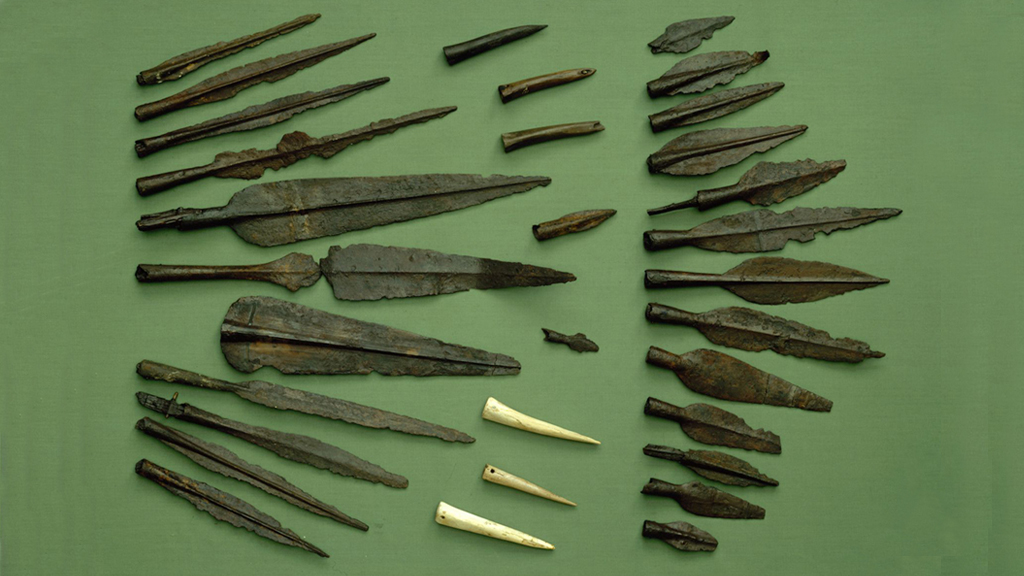
Clarification: by modern use of the term, "longsword" refer to late medieval "hand a half" sword, which is typically used mixed two handed with some strikes one-handed.You're looking for la Tene swords (which are classified by numbers - "la Tene II" for example), but they weren't really longswords by the proper use of the term.
And as Kiero correctly implies we don't really have a "historic" word for celtic swords (since they would be known as "swords" in Celtic). I would slightly disagree with your notion that they are predecessors of "spathas" (but the origin of spathas is a widely discussed topic so its best not to dwell on it).
As evident from the sowrd from Lindholmgård in this picture.
The la tene swords can have a very flat tip (especially in the late period), though more pointy version also exists.
Regarding other weapons: as grave goods and in bog sacrifices very few weapons beyond spear/sword (and shields) are found before 200AD. Axes seem not to have been popular, but might have existed. In any case in finds from 200-450AD it is hard to separate tool axes from weapon ones. Later on you get the narrow bladed axes more easily distinguished as weapons.
They really dont. We have plenty of "developed" dane axes into the 13th century, and then they beign to develop into poleaxes/halberds etc.They fall out of common use as armour coverage improves. Interestingly, it appears improvements in armour were what allowed them to become a frequent battlefield weapon at all- they generally seem to only be used by heavily armoured elite warriors who can afford to stop using their shield whilst they wield the axe.
Picture of danish axes from Grathe Hede battle in 1157:
Spoiler
"Success" of daneaxes against mail is a tricky question. I think it will have some success, especially against many of the lighter mails from the period.Last edited by Tobtor; 2018-01-06 at 10:29 AM.
-
2018-01-06, 10:50 AM (ISO 8601)Ogre in the Playground

- Join Date
- Aug 2009
 Re: Got a Real-World Weapon, Armor or Tactics Question? Mk. XXIV
Re: Got a Real-World Weapon, Armor or Tactics Question? Mk. XXIV
Kiero: Thank you

Some follow-up questions:
Do you happen to know the words the Achaemenids used for their spears?
Same question for the celtic spears.
Hm, so nothing standing out like the later Shotels.I've got access to a number of historians, I'd have to ask them, though much of the information for that period is spotty. They're often relying on later stuff. They did adopt Hellenistic equipment when they could afford it, in mercenary service to the (Ptolemaic) Egyptians. But for the most part, they continued to use the same stuff they would otherwise - bows, javelins, spears, axes and clubs. Big buffalo or elephant hide shields. Little armour apart from cavalrymen (who would also have swords).
Yeah, those are exactly the swords I'm thinking ofYou're looking for la Tene swords (which are classified by numbers - "la Tene II" for example), but they weren't really longswords by the proper use of the term.
I just call them "longswords" in conceptional sense to differentiate them from shorter sword types like the Xiphos.
Do you know a contemporary celtic name for these swords? "La Tene" is the modern name of the place these swords are associated with, not the name a 3rd century BC Galatian warrior would use
Yes, I was thinking of Parthian maces, but Parthians are still some centuries off of the period I'm interessted in. Do you think such weapons were used in hellenistic or earlier times?Loads of horseman's maces in Mesopotamia and central Asia, the Parthians and others liked them. You should be able to find Osprey books with decent images of them.
Oh, and I got some new qestions:
Daggers. I could not find an egyptian or greek expression for "Dagger". But I can't believe there werent any daggers in use before the romans came up with the Pugio.
Bows. For the greeks Archers were "Toxotai". Toxotai from Crete were especially valued. The Achaemenids had a stronger emphasis on archers and used different bows.
But in both cases I could not find how these weapons were actually called.
-
2018-01-06, 11:37 AM (ISO 8601)Orc in the Playground


- Join Date
- Oct 2012
 Re: Got a Real-World Weapon, Armor or Tactics Question? Mk. XXIV
While I agree with G's overall point of a skewed picture of centre-periphery of the medieval period in public mind, I also think he is prone to overstate things.All those marvelous illustrated books, like the copies of Froissart etc., that we use as our windows into battles like Agincourt and Crecy and so on, were made in Free Cities in Flanders, not in France. France did not have the powerful artists guilds, paper-mills, and scriptoria to produce this kind of stuff on the same scale.
Re: Got a Real-World Weapon, Armor or Tactics Question? Mk. XXIV
While I agree with G's overall point of a skewed picture of centre-periphery of the medieval period in public mind, I also think he is prone to overstate things.All those marvelous illustrated books, like the copies of Froissart etc., that we use as our windows into battles like Agincourt and Crecy and so on, were made in Free Cities in Flanders, not in France. France did not have the powerful artists guilds, paper-mills, and scriptoria to produce this kind of stuff on the same scale.

After 1450 when the movable type printing press arrived in Germany, note where they were producing books and where they weren't:

As you can see pretty clearly on that map of 'incunabla' - printed books and pamphlets created before 1500, the cultural epicenter was not in the 'West' i.e. England or France as our media would imply, but in the center.
He is right about the printing press, but that isnt the only way to measure cultural influence, especially as he includeds "high" medieval era as well (and only exclude Carolingian period). For example Gothic architecture from 1200-1400 century (high medieval).
Spoiler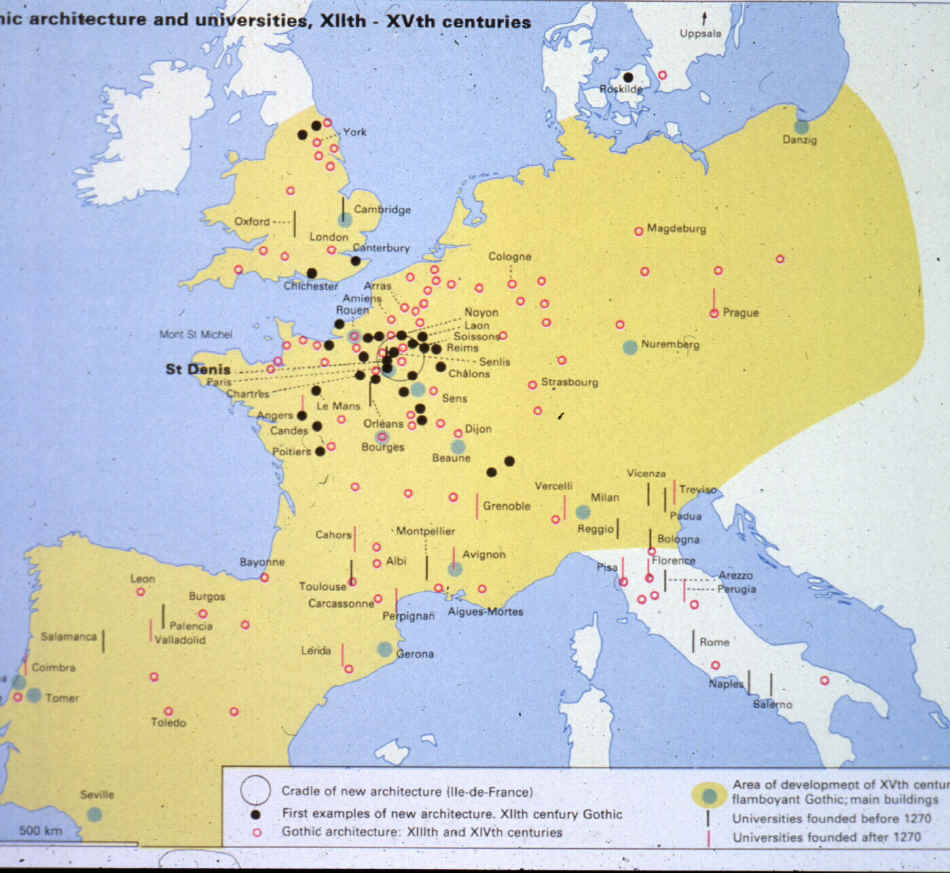
Similarly if we look at the universities. In the 12th century there would only be universities in France and Italy (and late in England), and it is true that as we go on, Italy dominates more and more. But even in the 15th century the north sea coast is NOT the place to be for universities. It is true that by this time Italy dominates, but it is ALSO true that everywhere in Northern and Western Europe (including those important towns G mentions such as Brügge etc) looked to Paris as the main university. Well after the medieval period in the 16-17th century Paris still was held in high regard across northern Europe as the prestigious place to be.
Spoiler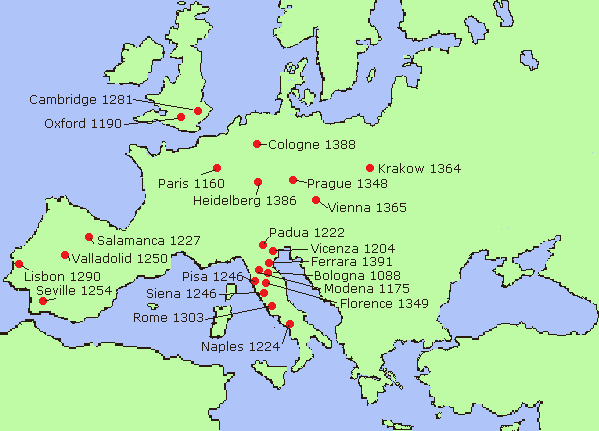
Spoiler
As Vinyadan makes a point about France was a main contributor to literature etc well after the Carolingian period. Also In seem as if G tries to make it out as a southern France thing, and true many of the "troubadours" where from this region, but we also have peole like Chrétien de Troyes from Northern France (in general the ones from the northern part do more longer stories with knights of the round table). We have some important contributions into the first half of the 13th century , but it is true that the importance might be said to decrease during the 100-year war.
I agree with Vinyadan that "italian" became the fancy language in France, but French remained a fancy language outside France (at least in Northern Germany and Scandinavia), much more so than lets say Dutch or German languages, which remained a "merchants language", which better than the native ones in Scandinavia (and other places), but still below French.
So while most of France WAS a rural backwater, Paris was still where influences from Italy was translated into Northern Europe (including the Netherlands).





 Reply With Quote
Reply With Quote
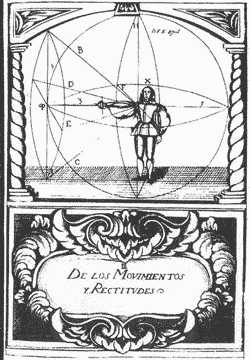

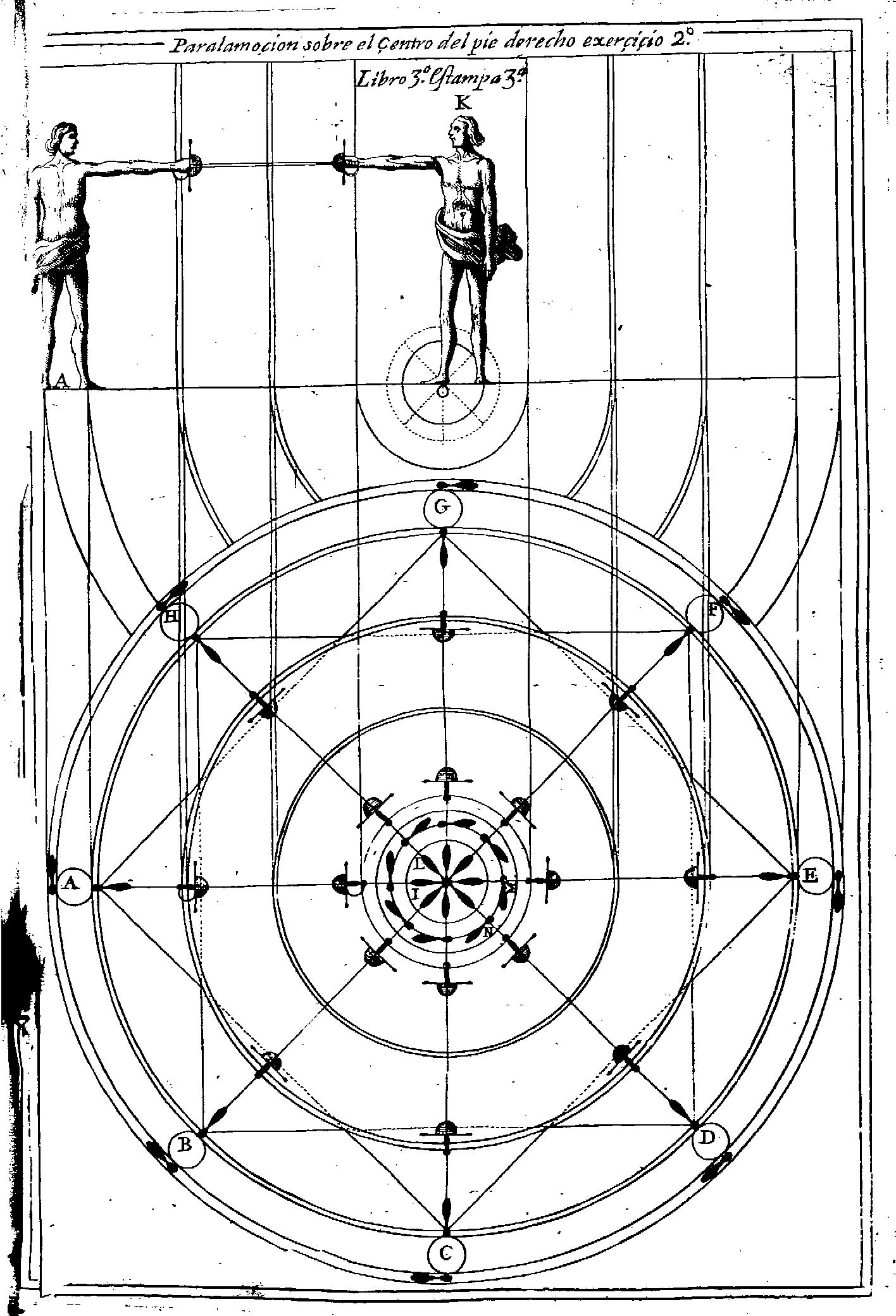
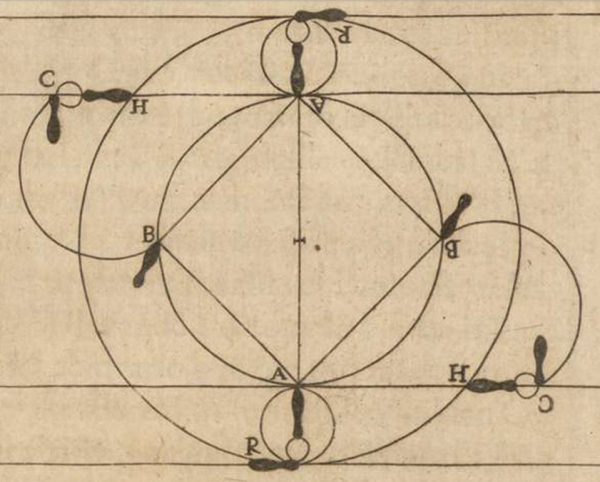








 RSS Feeds:
RSS Feeds: 

